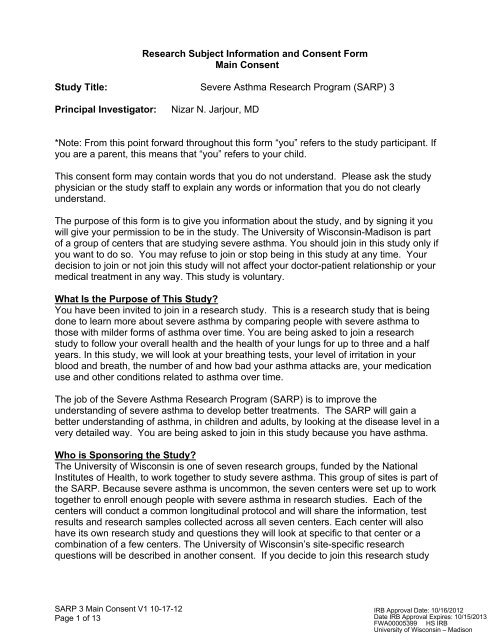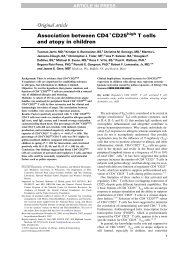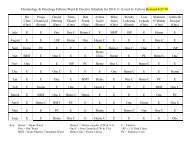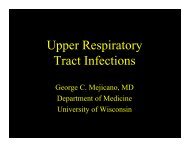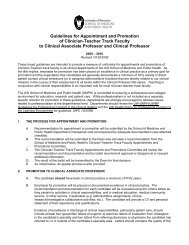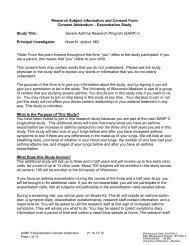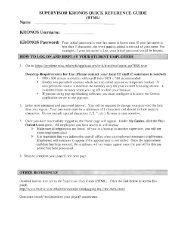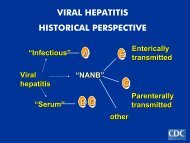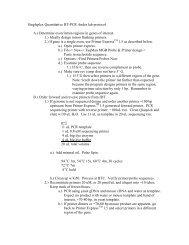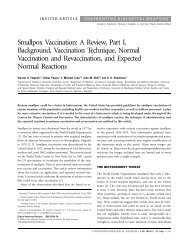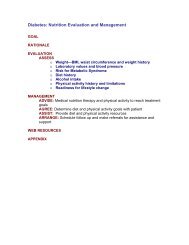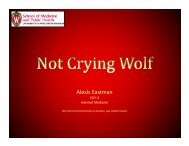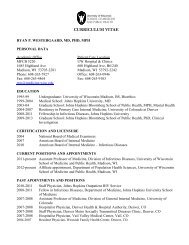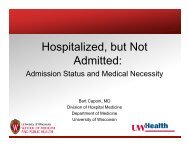Research Subject Information and Consent Form Main Consent ...
Research Subject Information and Consent Form Main Consent ...
Research Subject Information and Consent Form Main Consent ...
You also want an ePaper? Increase the reach of your titles
YUMPU automatically turns print PDFs into web optimized ePapers that Google loves.
<strong>Research</strong> <strong>Subject</strong> <strong>Information</strong> <strong>and</strong> <strong>Consent</strong> <strong>Form</strong><strong>Main</strong> <strong>Consent</strong>Study Title: Severe Asthma <strong>Research</strong> Program (SARP) 3Principal Investigator:Nizar N. Jarjour, MD*Note: From this point forward throughout this form “you” refers to the study participant. Ifyou are a parent, this means that “you” refers to your child.This consent form may contain words that you do not underst<strong>and</strong>. Please ask the studyphysician or the study staff to explain any words or information that you do not clearlyunderst<strong>and</strong>.The purpose of this form is to give you information about the study, <strong>and</strong> by signing it youwill give your permission to be in the study. The University of Wisconsin-Madison is partof a group of centers that are studying severe asthma. You should join in this study only ifyou want to do so. You may refuse to join or stop being in this study at any time. Yourdecision to join or not join this study will not affect your doctor-patient relationship or yourmedical treatment in any way. This study is voluntary.What Is the Purpose of This Study?You have been invited to join in a research study. This is a research study that is beingdone to learn more about severe asthma by comparing people with severe asthma tothose with milder forms of asthma over time. You are being asked to join a researchstudy to follow your overall health <strong>and</strong> the health of your lungs for up to three <strong>and</strong> a halfyears. In this study, we will look at your breathing tests, your level of irritation in yourblood <strong>and</strong> breath, the number of <strong>and</strong> how bad your asthma attacks are, your medicationuse <strong>and</strong> other conditions related to asthma over time.The job of the Severe Asthma <strong>Research</strong> Program (SARP) is to improve theunderst<strong>and</strong>ing of severe asthma to develop better treatments. The SARP will gain abetter underst<strong>and</strong>ing of asthma, in children <strong>and</strong> adults, by looking at the disease level in avery detailed way. You are being asked to join in this study because you have asthma.Who is Sponsoring the Study?The University of Wisconsin is one of seven research groups, funded by the NationalInstitutes of Health, to work together to study severe asthma. This group of sites is part ofthe SARP. Because severe asthma is uncommon, the seven centers were set up to worktogether to enroll enough people with severe asthma in research studies. Each of thecenters will conduct a common longitudinal protocol <strong>and</strong> will share the information, testresults <strong>and</strong> research samples collected across all seven centers. Each center will alsohave its own research study <strong>and</strong> questions they will look at specific to that center or acombination of a few centers. The University of Wisconsin’s site-specific researchquestions will be described in another consent. If you decide to join this research studySARP 3 <strong>Main</strong> <strong>Consent</strong> V1 10-17-12Page 1 of 13IRB Approval Date: 10/16/2012Date IRB Approval Expires: 10/15/2013FWA00005399 HS IRBUniversity of Wisconsin – Madison
This involves having one of the study personnel looking at your private areas todetermine your stage of puberty. It is important to underst<strong>and</strong> how these changes withpuberty affect aspects related to your asthma. There will be one other hospital or studypersonnel present as a chaperone. To make sure we do not miss any of these changes,this exam will be done every 12 months until you have reached the final stage of puberty.Spirometry: You will be asked to take a deep breath in <strong>and</strong> blow your breath out as hard<strong>and</strong> fast as you can into a machine for at least 6 seconds. This machine measures theamount of air you have in your lungs <strong>and</strong> how well you can blow the air out. We haveyou do this 2 or 3 times so we can get an accurate measure of your lung function. Thiswill be measured at each clinic visit.Maximum bronchodilator response: At Visits 1c, 2, 3, 4, 5, <strong>and</strong> 6 you will do spirometry<strong>and</strong> then take 2 puffs of albuterol. 15 minutes later you will do spirometry again. You willcontinue to take another 2 puffs of albuterol with spirometry measured 15 minutes lateruntil you no longer get any better. For this test you will receive no more than 8 puffs ofalbuterol.Exhaled nitric oxide (ENO): Nitric oxide is a gas that is released from inflammatory cellsin the lung. You will gently blow air out into a machine for a 10 second period of time.This procedure will be done at Visits 2, 3, 4 <strong>and</strong> 5.Exhaled breath condensate (EBC): You will be asked to put on nose clips <strong>and</strong> put amouthpiece in your mouth. You will breathe normally for 10-15 minutes. At the end ofthat time you will remove the mouthpiece <strong>and</strong> the nose clips. If you cough, sneeze or feelsaliva collecting in your mouth during the test you will be asked to stop <strong>and</strong> remove themouthpiece. After you cough, blow your nose or spit out saliva you may put themouthpiece back in your mouth <strong>and</strong> continue to breathe normally until the end of thecollection time. While you are breathing normally the air you breathe out is cooled <strong>and</strong>forms a liquid that drips into a collection container. The sample is frozen <strong>and</strong> analyzed ata later date. This procedure will be done at Visits 2, 3, 4 <strong>and</strong> 5.Sputum Induction: This is a procedure for obtaining some mucus or phlegm from yourlower airways, if you are 12 years of age or older. Before the procedure you will be given4 puffs of an albuterol inhaler to protect against bronchospasm (tightening of thebronchial tubes). You will inhale a mist of salt water through a mouthpiece for about 12minutes. You will be asked to stop every 4 minutes, blow your nose, <strong>and</strong> rinse gargle<strong>and</strong> spit with water. Then you will be asked to cough up some of the mucus from yourlower airways <strong>and</strong> spit it into a collection cup. We will check your lung function afterevery 4 minutes to make sure it hasn’t decreased. This procedure takes about 45minutes. This procedure will be done at Visits 2, 3, <strong>and</strong> 4.Blood draw: We will draw about four ounces or eight tablespoons of blood over thecourse of the study if you are 18 years of age or older. We will draw just over two ouncesor four <strong>and</strong> a half tablespoons of blood if you are less than 18 years old. This procedurewill be done at Visits 2, 3, 4 <strong>and</strong> 5. The area inside your elbow will be wiped down withalcohol prior to placing the needle in the vein. Part of the blood drawn at Visits 2 <strong>and</strong> 3will be for genetic sampling <strong>and</strong> is described in more detail below. This blood will bedrawn only if you agree. The other blood that is drawn throughout the study is to look atthe numbers <strong>and</strong> types of cells in your blood.Triamcinolone acetonide treatment: At the end of Visit 2, you will be given a 1 mL shot ofTriamcinolone acetonide. If you are less than 18 years, this amount may be less <strong>and</strong> will beSARP 3 <strong>Main</strong> <strong>Consent</strong> V1 10-17-12Page 3 of 13IRB Approval Date: 10/16/2012Date IRB Approval Expires: 10/15/2013FWA00005399 HS IRBUniversity of Wisconsin – Madison
adjusted to your body weight. This will be given as a single shot into your butt. Triamcinoloneacetonide is a steroid medication that is approved by the FDA for the treatment ofinflammation in people with asthma. The purpose for this treatment is to allow the researchersto look at different measures of inflammation before <strong>and</strong> after you receive the steroid treatmentto see if there are any changes. The dose of study medicine that you will receive is within thesafe range. You will continue your usual asthma medications throughout the duration of thisstudy.During this study, the following procedure might be performed if required:Methacholine challenge: Methacholine is a chemical that can cause the airway tubes totighten <strong>and</strong> can act like asthma symptoms. People who have asthma have airways thatare sensitive to smaller amounts of methacholine than people without asthma. This testmeasures how sensitive your airway tubes are to the methacholine. We will measureyour lung function. You will be asked to breathe in 5 inhalations of methacholine, startingat a very low amount. This will be given through a nebulizer. Your lung function will bemeasured 3 minutes after each amount of methacholine, if your lung function has notdecreased by 20% the amount of the next dose doubles. The challenge will be stoppedwhen your lung function measurements have decreased 20% from your baseline or youreceive the highest amount we are using. This takes approximately one hour. This will bedone once on Visit 1b if needed. If you have previously participated in an NIH studyinvolving methacholine, you may not need to complete this procedure.What are the risks of the study?Asthma questionnaires: The questionnaires are not tests; there are no “right” or “wrong”answers. There are no known risks to answering the questionnaires. The questionnairesmight be considered long with repeating questions. You can skip any question you feeluncomfortable answering.Holding asthma medication: For some visits, the study staff may ask you to not takeyour asthma medication before the visit. If your asthma symptoms get worse <strong>and</strong> you feelthat you need to take your medication, please take your asthma medicine <strong>and</strong> call thestudy staff to let them know.Urine collection: There are no known risks for the collection of urine.Spirometry: During spirometry you may feel short of breath during the 6-secondexhalation part. If this occurs <strong>and</strong> does not go away on its own you may be given 2 puffsof an albuterol inhaler.Maximum bronchodilator test: You might have coughing or lightheadedness withspirometry. You will get up to 8 puffs of albuterol for this test. Taking up to 8 puffs ofalbuterol can make your heart race, make you feel jittery or nervous, can increase yourblood pressure, cause nausea or headache. These feelings are temporary.Exhaled nitric oxide (ENO): ENO is a breathing test with no known risks.Exhaled breath condensate (EBC): There are no known risks to this procedure. It isnoninvasive. It is possible you may start to feel resistance when you exhale if the liquidfreezes before it drips into the sample collection container. If you feel this resistance youmay stop. We will then warm the frozen liquid to allow it to drip into the collectioncontainer. After that you can go back to breathing through the machine to complete thecollection time.SARP 3 <strong>Main</strong> <strong>Consent</strong> V1 10-17-12Page 4 of 13IRB Approval Date: 10/16/2012Date IRB Approval Expires: 10/15/2013FWA00005399 HS IRBUniversity of Wisconsin – Madison
Sputum Induction: You may experience a salty after taste in the mouth, coughing, afeeling of needing to swallow, a sore throat, shortness of breath, wheezing, chesttightness, lightheadedness, nausea or headache. In rare cases, some patients have hada severe asthma attack or a reaction to the salty water that they breathe in.Bronchodilator treatment will be available if this occurs.Blood draw: You may experience some pain or bruising where the needle enters theskin. You may also feel faint or sick to your stomach while having your blood drawn.There is a rare risk of infection where the needle enters the skin.Triamcinolone acetonide treatment: Side effects with this steroid are not very common.However, side effects of a shot in your muscle have been reported, including atrophy (a“dimple”) at the injection site <strong>and</strong> changes in skin color. These side effects are kept low byplacing the drug deep into the muscles. All triamcinolone shots will be given by anexperienced member of the study staff. Side effects in the body after a single shot oftriamcinolone are rare. However, with continuous or repeated use, muscle weakness, bonefractures, ulcers, impaired wound healing, <strong>and</strong> growth suppression may occur. To lower theserisks, you will be screened thoroughly by a physician for the likelihood of side effects beforethe shot is given. We will tell you what problems to look for <strong>and</strong> we will call you within 72hours to make sure that you are OK. Also you will have 24-hour access to an on-callphysician while you are participating in this study.Risk of disclosure: Your research samples <strong>and</strong> data will not be labeled with your name orother items that might identify you. All data will be stored in a password protected, studyspecific database <strong>and</strong> will be labeled with a code number. There will be very limited access tothe link between your name or other personal information <strong>and</strong> the study code. Because thislink will exist, there is a small risk that your name may become known in association with thisresearch study.Methacholine challenge: During this procedure you may experience asthma symptomssuch as shortness of breath, wheezing, tightness or cough. You will be given severalpuffs of an albuterol inhaler for relief of symptoms. The symptoms are usually gonewithin a few minutes after using the medication.What are the Benefits of Study Participation?You are not guaranteed any benefit from participation in this study. Your participation inthis study will help researchers underst<strong>and</strong> more about severe asthma. The results fromthis study may help us find a better way to treat asthma <strong>and</strong> may benefit other asthmapatients in the future.Will I be Paid for My Participation?You will be paid for your participation. The amount you receive depends on which parts ofthe study you complete. If you qualify for the study after screening <strong>and</strong> complete thestudy visits outlined in this consent form, you will be paid up to $795. If you stopparticipating before the end of the study or if the study is discontinued through no fault ofyours, you will receive a partial payment based upon your participation in the study.Visit Description Approximate Length ReimbursementVisit 1a 2.0 hrs $100Visit 1b (if needed) 1.0 hr $50SARP 3 <strong>Main</strong> <strong>Consent</strong> V1 10-17-12Page 5 of 13IRB Approval Date: 10/16/2012Date IRB Approval Expires: 10/15/2013FWA00005399 HS IRBUniversity of Wisconsin – Madison
Visit 1c 1.0 hr $50Visit 2 2.5 hrs $125Visit 3 2.0 hrs $100Visit 4 2.5 hrs $125Visit 5 2.0 hrs $100Visit 6 2.0 hrs $100Phone contactMonths 6, 18, 300.5 hrs $15 per contactWhat Are My Alternatives to Participating?Your participation in this study is voluntary. You may choose not to participate in thisresearch study.Who Will See The Study Records?To the extent possible, your participation in this study will remain private. The principalinvestigator as well as people from the NIH (National Institute of Health) <strong>and</strong> the Data <strong>and</strong>Safety Monitoring Committee may review your medical records about this study. The SARPinvestigators will have access to the information that you have agreed to share. The results ofthis study may be published in scientific journals or be presented at medical meetings;however, individual patients will not be identified by name. The data will be coded with anumber. Only the Investigator <strong>and</strong> his study staff at this site have access to the code that linksyour name with your study number <strong>and</strong> data. Paper copies are kept in a locked file cabinet inlocked rooms, electronic data is password protected.Certificate of ConfidentialityTo help us protect your privacy, we have obtained a Certificate of Confidentiality from theNational Institutes of Health. With this Certificate, the researchers cannot be forced to discloseinformation that may identify you, even by a court subpoena, in any federal, state, or local civil,criminal, administrative, legislative, or other proceedings. The researchers will use theCertificate to resist any dem<strong>and</strong>s for information that would identify you, except as explainedbelow.The Certificate cannot be used to resist a dem<strong>and</strong> for information from personnel of the UnitedStates Government that is used for auditing or evaluation of Federally funded projects or forinformation that must be disclosed in order to meet the requirements of the federal Food <strong>and</strong>Drug Administration (FDA).You should underst<strong>and</strong> that a Certificate of Confidentiality does not prevent you or a memberof your family from voluntarily releasing information about yourself or your involvement in thisresearch. If an insurer, employer, or other person obtains your written consent to receiveresearch information, then the researchers may not use the Certificate to withhold thatinformation.The Certificate of Confidentiality does not prevent the researchers from disclosing voluntarily,without your consent, information that would identify you as a participant in the researchproject if required by law (e.g. child abuse, reportable communicable disease, threat of harm toSARP 3 <strong>Main</strong> <strong>Consent</strong> V1 10-17-12Page 6 of 13IRB Approval Date: 10/16/2012Date IRB Approval Expires: 10/15/2013FWA00005399 HS IRBUniversity of Wisconsin – Madison
self or others) or as required by state or federal agencies who may review our records underlimited circumstances, (e.g. such as a U.S. Department of Health <strong>and</strong> Human Services(DHHS) request for information for an audit or program evaluation or an FDA request underthe Food, Drug <strong>and</strong> Cosmetics Act.)Will There Be Any Costs To Me?There will be no charge to you for participation in this study.Will There Be Compensation For Injury?In the event that you are physically injured as a result of participating in this study,emergency care will be available. You will, however, be responsible for the charges forthe emergency care. There is no commitment by the University of Wisconsin to provideany compensation for research-related injury. You should realize that you have notreleased this institution from liability for negligence. Please contact the investigator, Dr.Nizar Jarjour, at (608) 263-9344 if you are injured or for further information.If I Start This Study, Can I Stop?If you choose not to participate in this study, your doctor will continue to treat yourasthma. Your participation is voluntary. You are free to refuse to participate in the study<strong>and</strong> may stop participating in the study at any time without any change in the quality ofmedical care to which you are entitled. Your physician may also end your participation inthe study if he/she judges it to be in your best interest. Your participation in the studymay be stopped for any of the following reasons:A. Failure to follow the investigator’s instructionsB. A serious adverse reaction, which may require evaluationC. If the investigator feels it is in the best interest of your health <strong>and</strong> welfareIn addition the investigator or the NIH may end your participation in the study at any timewith or without your consent.Sample Storage <strong>and</strong> Shared Procedures:Below, we describe the different kinds of information that we will collect about you for thisresearch study.1. Sharing <strong>and</strong> Storing of Questionnaires, Test Results <strong>and</strong> Samples: During thecourse of this study, the study investigator Dr. Nizar Jarjour, or a member of the studyteam will ask you to answer questionnaires about your medical history includinginformation on your asthma, current symptoms, present <strong>and</strong> past medical treatment,asthma triggers <strong>and</strong> the impact of asthma on your life, your age <strong>and</strong> place of birth.You will also be asked to do breathing tests, blood tests <strong>and</strong> other research relatedstudies, <strong>and</strong> collect sputum cells/fluid, urine, exhaled breath condensate <strong>and</strong> bloodsamples. The results of these questionnaires, tests, <strong>and</strong> some of the samples will beused now. Some of the information <strong>and</strong> left over samples will be stored for studies tobe done in the future. The information <strong>and</strong> samples may be stored for up to 50 yearsto look at scientific questions related to asthma, allergies <strong>and</strong> related diseases. TheSARP 3 <strong>Main</strong> <strong>Consent</strong> V1 10-17-12Page 7 of 13IRB Approval Date: 10/16/2012Date IRB Approval Expires: 10/15/2013FWA00005399 HS IRBUniversity of Wisconsin – Madison
questionnaires, test results <strong>and</strong> samples will be h<strong>and</strong>led in a manner that protectsyour privacy; they will only be identified by a code. Only Dr. Jarjour <strong>and</strong> the Universityof Wisconsin study team will have the link between the code <strong>and</strong> your name.. Theinvestigators may share the stored questionnaire data, test results or tissue/sampleswith other investigators in the SARP or other groups for research related to asthma,allergy <strong>and</strong> inflammation. However, your identity will be kept private as only the codewill identify your sample now <strong>and</strong> in the future.The sharing <strong>and</strong> storing of the questionnaire data, test results <strong>and</strong> samples is notoptional. If you do not want to have your questionnaire data, test results or samplesshared or stored with the other investigators in SARP or other groups researchingasthma, allergy <strong>and</strong> inflammation, you will not be allowed to join this study.2. Genetic Studies - A blood sample (2 tablespoons) will be collected to evaluate genes(DNA) that may be related to the development of asthma, allergy, respiratory <strong>and</strong>related diseases. No other genes will be studied. DNA is the genetic materialcontained in all the cells of your body, including blood cells. Your blood will also betested for the numbers of eosinophils (white blood cells thought to be important inasthma) <strong>and</strong> IgE (a protein that is elevated in people with allergies). The samples willbe collected <strong>and</strong> coded such that only the primary investigator at the University ofWisconsin will be able to link your genes to you.Work with your cells <strong>and</strong> DNA will be done at Wake Forest School of Medicine(Winston-Salem, NC). Your name <strong>and</strong> participation in these studies will be private.Your genetic samples will be identified only by an ID number (not your name), <strong>and</strong> nogenetic testing will be performed other than that associated with asthma, allergy,respiratory <strong>and</strong> related diseases. Any identifying data is kept in a locked drawer or in apassword protected computer file. Only the Principal Investigator of this study <strong>and</strong> hisdesignated data manager will have access to the numeric code, which identifies youby name. These results will NOT be put in your medical records. No HMOs orinsurance companies will ever be allowed access to the genetic results.As part of the genetic study, a sample of your DNA may have Genome WideAssociation Studies (GWAS) or Whole Genome Sequencing (WGS) performed. TheGWAS analysis creates a very detailed picture of your DNA for researchers using upto 2 million genetic markers. WGS is an analysis of your complete genetic code <strong>and</strong>has the capability to identify nearly all genetic mutations in your DNA.In addition, information regarding your DNA <strong>and</strong> clinical information about you will besent to the National Institute for Health's Genome Wide Association Study (GWAS)data repository, where it will undergo genome-wide analysis <strong>and</strong> be shared with otherinvestigators for research purposes. DNA <strong>and</strong> information sent to the GWAS will helpresearchers better underst<strong>and</strong> how genes affect the risk of developing diseases suchas asthma, cancer, diabetes, <strong>and</strong> heart disease, <strong>and</strong> may lead to better methods toselect the best treatment options. Before your information is sent to the GWAS datarepository it will be de-identified, which means that we will remove any identifyingSARP 3 <strong>Main</strong> <strong>Consent</strong> V1 10-17-12Page 8 of 13IRB Approval Date: 10/16/2012Date IRB Approval Expires: 10/15/2013FWA00005399 HS IRBUniversity of Wisconsin – Madison
information such as your name, date of birth, address, etc. The code that once linkedthe data back to you will be removed prior to the data being sent to the NIH GWASdata repository. Thus, researchers using your DNA <strong>and</strong> clinical data will not be able tolink this information back to you.The laboratory that is processing your DNA is a research facility <strong>and</strong> does not havethe ability to provide genetic test results or genetic counseling Genetic informationabout you or other information obtained from your sample will not be given to you,your family or your doctor. You may withdraw consent for the use of your DNA at anytime by contacting Dr. Nizar Jarjour at (608) 263-9344. However:a) Although the genetic information about you is shared with other investigators inthe network, it is identified with a code number <strong>and</strong> not your name or otheridentifiable information. Only researchers at the University of Wisconsin will beable to link your information with your name.b) Results from research using your samples may be presented in publications<strong>and</strong> meetings but individual names will not be identified.c) Absolute privacy cannot be guaranteed as the U.S. Department of Health <strong>and</strong>Human Services has the right to inspect your medical records relating to thisresearch for the purposes of verifying data. Demographic information on thesubjects is released only to characterize our populations for the NationalInstitutes of Health.d) In order to protect records, 1) only allowed users will be able to see therecords, 2) the records will be kept in offices that are locked when not in use,<strong>and</strong> 3) access is strictly controlled. The records collected in this study will besubject to the Privacy Act. Records will not be shown to any person or agency,unless the person who the records are about gives a written request or priorconsent. The request should be made in writing to the Privacy Act Coordinator,NHLBI, NIH, Building 31, Room 5A10, 9000 Rockville Pike, Bethesda, MD20892.I agree to allow blood collection for genetic studies <strong>and</strong> biochemical analysis <strong>and</strong> toshare the samples with the SARP centers <strong>and</strong> the NIH GWAS Data Repository.Circle one: Yes No ______________<strong>Subject</strong>’s Initials3. Left Over Samples - We will use the samples collected in this study for the scientificquestions described above between this site <strong>and</strong> the other SARP sites. Sometimesthe planned experiments do not use the whole sample collected. We may put some ofthe left over samples in the SARP Biobank, if you agree <strong>and</strong> sign the SARP Biobankconsent form. Let us know whether the study investigator at this site, Dr. NizarSARP 3 <strong>Main</strong> <strong>Consent</strong> V1 10-17-12Page 9 of 13IRB Approval Date: 10/16/2012Date IRB Approval Expires: 10/15/2013FWA00005399 HS IRBUniversity of Wisconsin – Madison
please contact: Dr. Nizar Jarjour, at (608) 263-9344.A description of this clinical trial will be available on http://www.ClinicalTrials.gov, asrequired by U.S. Law. You can locate the SARP study at NCT01606826. This Web sitewill not include information that can identify you. At most, the Web site will include asummary of the results. You can search this Web site at any time.Authorization“I, ___________________________, have read the above <strong>and</strong> decided to participate inthe research project described above. My signature also indicates that I have received acopy of this consent.”__________________________Signature of <strong>Subject</strong>Date___________________________________________Printed name of <strong>Subject</strong>__________________________Signature of Person Obtaining <strong>Consent</strong>_________________DateLEGAL GUARDIAN/PARENT AUTHORIZATION:I have read this consent form. The purpose, procedures <strong>and</strong> benefits of this pre-studyvisit have been reviewed <strong>and</strong> discussed with my child <strong>and</strong> me. I voluntarily givepermission for my child’s participation in this research study. My signature indicates that Ihave received a copy of this consent form.________________________________<strong>Subject</strong> Name________________________________Signature of Parent or Legal Guardian________________Date________________________________Signature of Parent or Legal Guardian________________DateSARP 3 <strong>Main</strong> <strong>Consent</strong> V1 10-17-12Page 11 of 13IRB Approval Date: 10/16/2012Date IRB Approval Expires: 10/15/2013FWA00005399 HS IRBUniversity of Wisconsin – Madison


